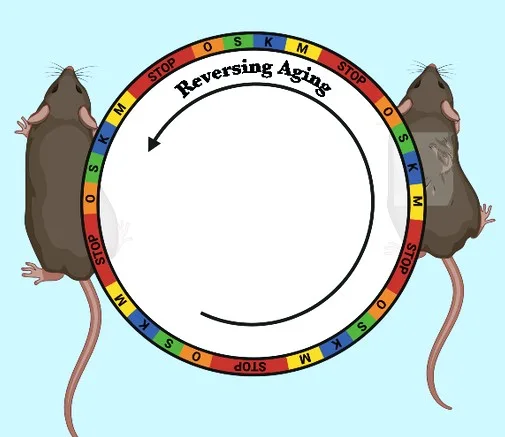Reverse Aging Through Epigenetic Reprogramming
In the quest to understand and potentially reverse the aging process, recent scientific breakthroughs have shed light on a fascinating approach: epigenetic reprogramming. This innovative field, standing at the forefront of anti-aging research, offers a promising glimpse into a future where aging might not only be slowed down but even reversed.

Understanding the Basics: Epigenetics and Aging
At its core, aging is a complex biological process, marked by the gradual decline in cellular and tissue function. One proposed cause of aging is the accumulation of “epigenetic noise.” This refers to changes in the way genes are expressed, without altering the underlying DNA sequence. Over time, these changes disrupt gene expression patterns, leading to decreased tissue function and a reduced capacity for regeneration.
The Role of Induced Pluripotent Stem Cells (iPSCs)
A pivotal development in this realm is the generation of induced pluripotent stem cells (iPSCs). iPSCs are derived from adult cells that have been genetically reprogrammed to an embryonic stem cell-like state. This process essentially “resets” the cells, erasing signs of aging and restoring their youthful characteristics. However, a significant challenge with this technique is that it typically involves complete dedifferentiation, meaning the cells lose their specialized functions and revert to a state where they can develop into any cell type.
Epigenetic Rejuvenation: A Promising Prospect
Epigenetic rejuvenation is an emerging concept that aims to separate the rejuvenative properties of reprogramming from the drawbacks of dedifferentiation. This approach utilizes reprogramming-induced rejuvenation strategies, often involving the use of Yamanaka factors. These factors, named after the Nobel Prize-winning scientist Shinya Yamanaka, are used to induce pluripotency. The key is to express these factors transiently, preventing the cells from losing their specialized functions completely.
Breakthroughs in CNS and Vision Restoration
One of the most remarkable recent achievements in this field is the use of epigenetic reprogramming in the central nervous system (CNS), particularly focusing on the eye as a model. By ectopically expressing a combination of genes (Oct4, Sox2, and Klf4) in mouse retinal ganglion cells, scientists have been able to restore youthful DNA methylation patterns and transcriptomes. This process not only promotes axon regeneration after injury but has also shown potential in reversing vision loss in mouse models of glaucoma and in aged mice.
The Role of DNA Demethylases
The success of this approach hinges on the presence of DNA demethylases, particularly TET1 and TET2. These enzymes play a crucial role in removing methyl groups from DNA, a key step in reversing the epigenetic changes associated with aging.
Future Implications and Ethical Considerations
The potential of epigenetic reprogramming in reversing aging holds immense promise. However, it also raises critical ethical considerations. As research progresses, it will be crucial to address these issues, ensuring that such advancements are used responsibly and for the betterment of human health.
In conclusion, the field of epigenetic reprogramming represents a thrilling frontier in the battle against aging. By unraveling the complexities of cellular aging and exploring innovative ways to reverse these processes, scientists are paving the way for revolutionary treatments that could profoundly impact our understanding of aging and longevity. As we continue to explore this promising avenue, the dream of turning back the biological clock is becoming an ever more tangible reality.
References:
Sinclair DA, Mills K & Guarente L Accelerated aging and nucleolar fragmentation in yeast sgs1 mutants. Science 277, 1313–1316 (1997). [PubMed] [Google Scholar]
Imai S & Kitano H Heterochromatin islands and their dynamic reorganization: a hypothesis for three distinctive features of cellular aging. Exp Gerontol 33, 555–570, doi: 10.1016/s0531-5565(98)00037-0 (1998). [PubMed] [CrossRef] [Google Scholar]
Oberdoerffer P et al. SIRT1 redistribution on chromatin promotes genomic stability but alters gene expression during aging. Cell 135, 907–918, doi: 10.1016/j.cell.2008.10.025 (2008). [PMC free article] [PubMed] [CrossRef] [Google Scholar]
Horvath S DNA methylation age of human tissues and cell types. Genome Biol 14, R115, doi: 10.1186/gb-2013-14-10-r115 (2013). [PMC free article] [PubMed] [CrossRef] [Google Scholar]
Kennard MA Relation of age to motor impairment in man and in subhuman primates. Archives of Neurology & Psychiatry 44, 377–397, doi: 10.1001/archneurpsyc.1940.02280080137008 (1940). [CrossRef] [Google Scholar]

I just could not leave your web site before suggesting that I really enjoyed the standard information a person supply to your visitors Is gonna be again steadily in order to check up on new posts
Hello,
We’re thrilled to hear that you enjoyed your visit to our website and found the information valuable. At Find Soft News Research Team, we strive to maintain a high standard of content and to consistently bring new insights to our visitors.
Your encouragement means a lot to us, and it motivates us to keep updating our site with fresh, informative content. We look forward to having you back to check on our new posts!
If there’s any particular topic or area you’re interested in learning more about, please let us know. We always appreciate suggestions from our readers, as it helps us cater to our audience’s interests more effectively.
We need your help to get the word out about our website.
Thank you once again for your kind words and support.
Warmest regards,
Find Soft News Research Team
The articles you write help me a lot and I like the topic
Thank you so much for your kind feedback! It’s incredibly rewarding to hear that our articles have been helpful to you and that you enjoy the topics we cover. At the Find Soft News Research Team, we strive to provide meaningful and insightful content that resonates with our readers. If there are any specific topics you’re interested in learning more about, please let us know. We value your input and look forward to continuing to support your curiosity and interests.
Warm regards,
Find Soft News Research Team
Thanks for posting. I really enjoyed reading it, especially because it addressed my problem. It helped me a lot and I hope it will help others too.
We’re delighted to hear that our article resonated with you and provided the help you were looking for! It’s feedback like yours that motivates us at the Find Soft News Research Team to continue our work and strive to address the issues that matter most to our readers. Knowing that our content has been beneficial to you and potentially others is incredibly rewarding.
Please feel free to share your story or let us know if there are other topics you’re interested in. We’re always looking for ways to support our community better. Thank you for your kind words and for being a valued member of our readership.
Warm regards,
Find Soft News Research Team
May I request that you elaborate on that? Your posts have been extremely helpful to me. Thank you!
Thank you for your post. I really enjoyed reading it, especially because it addressed my issue. It helped me a lot and I hope it will also help others.
I was just searching for this info for some time. After 6 hours of continuous Googleing, finally I got it in your website. I wonder what is the lack of Google strategy that do not rank this kind of informative sites in top of the list. Usually the top web sites are full of garbage.